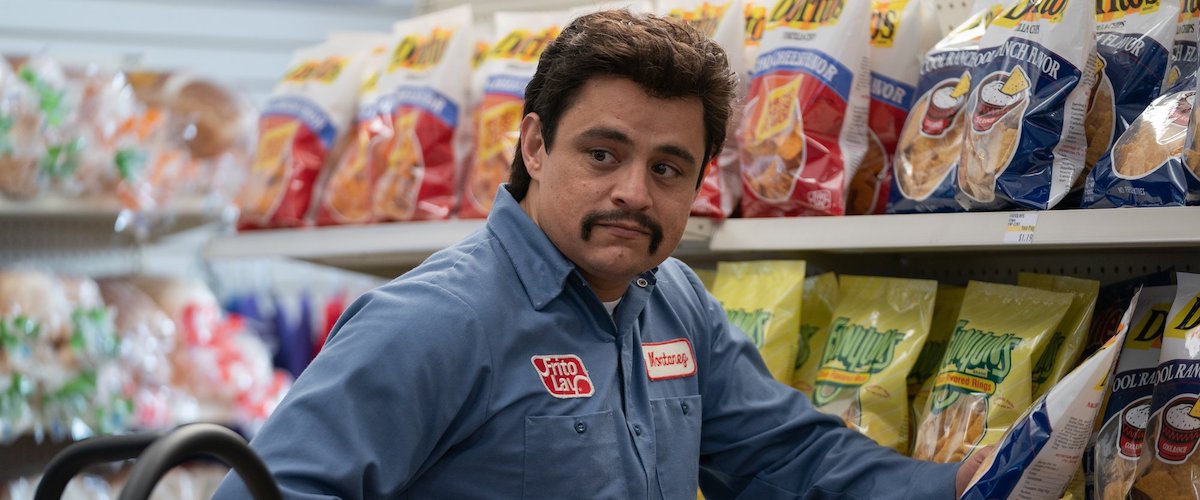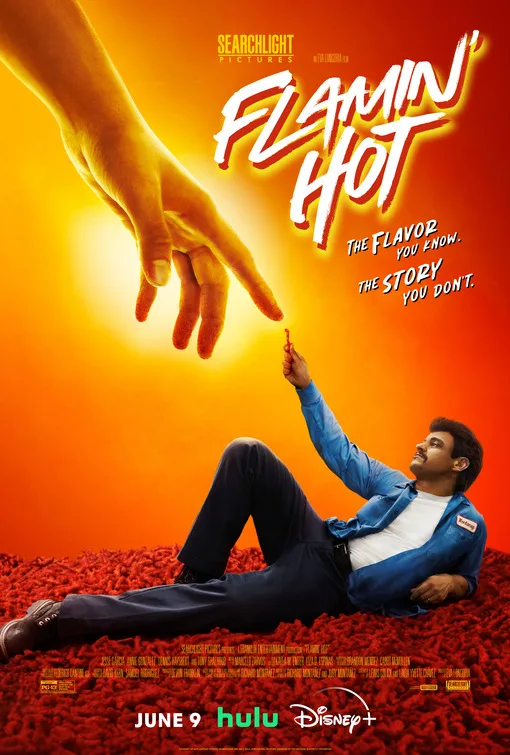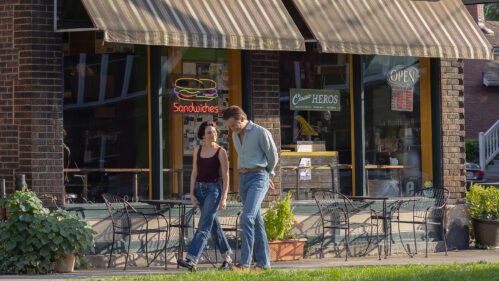With “Air,” “Tetris,” and “BlackBerry,” the last few months have borne both spring flowers and corporate biographies that mythologize well-known products and brands. Their narrative arcs follow a relatively familiar pattern: under-appreciated visionaries and everyday workers unite to face setbacks and product deadlines to go on to revolutionize their respective industries. The stories may not always end happily ever after, but this “How I Built This” kind of movie is inspirational catnip, like a working man’s version of a Horatio Alger story.
Earlier models of the format, like John Lee Hancock’s “The Founder” and David O. Russell’s “Joy,” were just hints at a growing interest in the lives of those behind well-known products and corporations, which seems to have grown in the ensuing years of inflation and economic insecurity—not too dissimilar to the current spate of movies set in the ‘80s and ‘90s, which also had their stretches of economic bumps. Maybe these movies are a little boost for bootstrapping morale: that all anyone needs to succeed is a little conviction and the right partners. At a time when white-collar workers are resisting the call to return to offices or some companies have done away with physical office spaces altogether, these period pieces can feel like they’re romanticizing (or cautioning against) what’s been lost—both the good (camaraderie, getting to know your coworkers outside of a Zoom box) and the bad (managerial abuse, white collar crime, no work-life balance, etc.).
Then there’s Eva Longoria’s narrative directorial debut, “Flamin’ Hot,” which, on a level of seriousness between a potential award hopeful like “Air” and the irreverent but biting “BlackBerry,” occupies its own too-silly-to-be-taken-seriously spot. “Flamin’ Hot” follows sometimes unreliable narrator and main character Richard Montañez (Jesse Garcia) from a rough, impoverished childhood, a mistake-filled adolescence, to an adulthood with some regrets. In the 1980s, he’s a desperate man looking for a second chance to provide for his family. He catches a break with the help of his adoring wife, Judy (Annie Gonzalez), and lands a job on the janitorial staff of a Frito-Lay plant in Rancho Cucamonga. Not only does Richard work hard, but he also pays close attention to the machines. Over time, he learns how they work with the help of a reluctant mentor, Clarence C. Baker (Dennis Haysbert). Richard’s hard work and tenacity lead him to invent a new spicy blend of snacks based on the flavors of his childhood. He then jumps the corporate ladder to pitch it to Frito Lay’s parent company president, Roger Enrico (Tony Shalhoub), and the rest is his tasty history.
Although “Flamin’ Hot” might be a finger-licking good story, it’s also not true. And now, I have to wrestle with its artificially sweet, feel-good inspirational story. What is the movie’s purpose if Frito-Lay told the filmmakers their source material was false? Was the janitor rags-to-riches story just too hot to drop? Do we, as a woefully underrepresented group in movies, need this story, facts be damned? As a Latina critic who has been writing about my community’s stories for as long as I’ve had a career, I want better for us and our storytellers. While I enjoy some aspects of this movie, I’m not sure the means justified the lackluster result.
The other corporate films I mentioned above have their fair share of fabricated conversations and different sequences of real-life events, but “Flamin’ Hot” isn’t interested in accuracy beyond vintage Frito-Lay logos. Instead, Longoria’s film becomes an extended lesson in tying a product to cultural identity, targeting an audience, and how to monetize them as prospective consumers. It’s just business, baby, and sometimes the characters in the middle get lost in the capitalist shuffle. Then again, Montañez’s self-mythologizing is his business, and this movie is now an extension of those efforts to rewrite history—a product placement, if you will—cinematically solidifying his alleged role in a product he didn’t create.
My ethical qualms aside, Longoria channels the hard-working Mexican American/Latino/immigrant ethos in her film, showing genuine love and respect for the hustle that keeps food on the table and the lights on despite impossible odds. In her version of the events, Richard earns redemption from his youthful mistakes by focusing on what’s best for his family and taking the extra initiative for an idea he believes will save his job and the company. Although this is supposed to be Richard’s success story, his scenes with Judy are the movie’s real highlights and give a ridiculous film some sturdy emotional grounding. Garcia’s bombastic performance was likely evened out by Gonzalez’s strong presence, even if selfishly, I wished she were in more scenes. Together, they shore up some goodwill to cover some of the film’s shaggier flaws. The longer they spend apart, the more the movie feels like it’s losing momentum until Shalhoub, as the corporate-Mr. Rogers-like Enrico, livens things up again.
Before the film begins with a line about calling Latinos “spicy,” it opens with a Mexican musical spin on the Searchlight theme, echoing Disney’s mariachi take on their opening theme when Pixar’s “Coco” hit theaters. This choice sets a celebratory tone, but it feels off. Where “Coco” was a celebration of a traditional holiday, “Flamin’ Hot” feels like it’s selling me something, be it Montañez’s story or its can-do message. Writers Linda Yvette Chávez and Lewis Colick can’t quite find a balance between the relatable human drama and low-brow jokes—like extended sequences of mostly white men in boardroom meetings talking like fighting cholos, as voiced by Richard—or cliched moments like a sports movie-like rally to fire up the plant to sell Flamin’ Hot products.
Overall, “Flamin’ Hot” is more cheesy than spicy. Its focus on the “Si, se puede … trabajar y ganar dinero” mantra dulls the flavors of what makes the movie enjoyable: the family at the center of Richard’s drive to survive. Even then, I still struggle with the lingering aftertaste of its half-true/not-at-all-true fable about the American success story. What does it say when we lionize a person who says they did something they didn’t and hold them up as a pillar of our community, who, if anything, perfected selling our connections to our culture back to ourselves as a form of identity consumerism? Near the end of John Ford’s “The Man Who Shot Liberty Valance,” one character throws out the truth and says, “When the legend becomes fact, print the legend.” If nothing else, “Flamin’ Hot” does that best.
Now playing on Hulu.




















